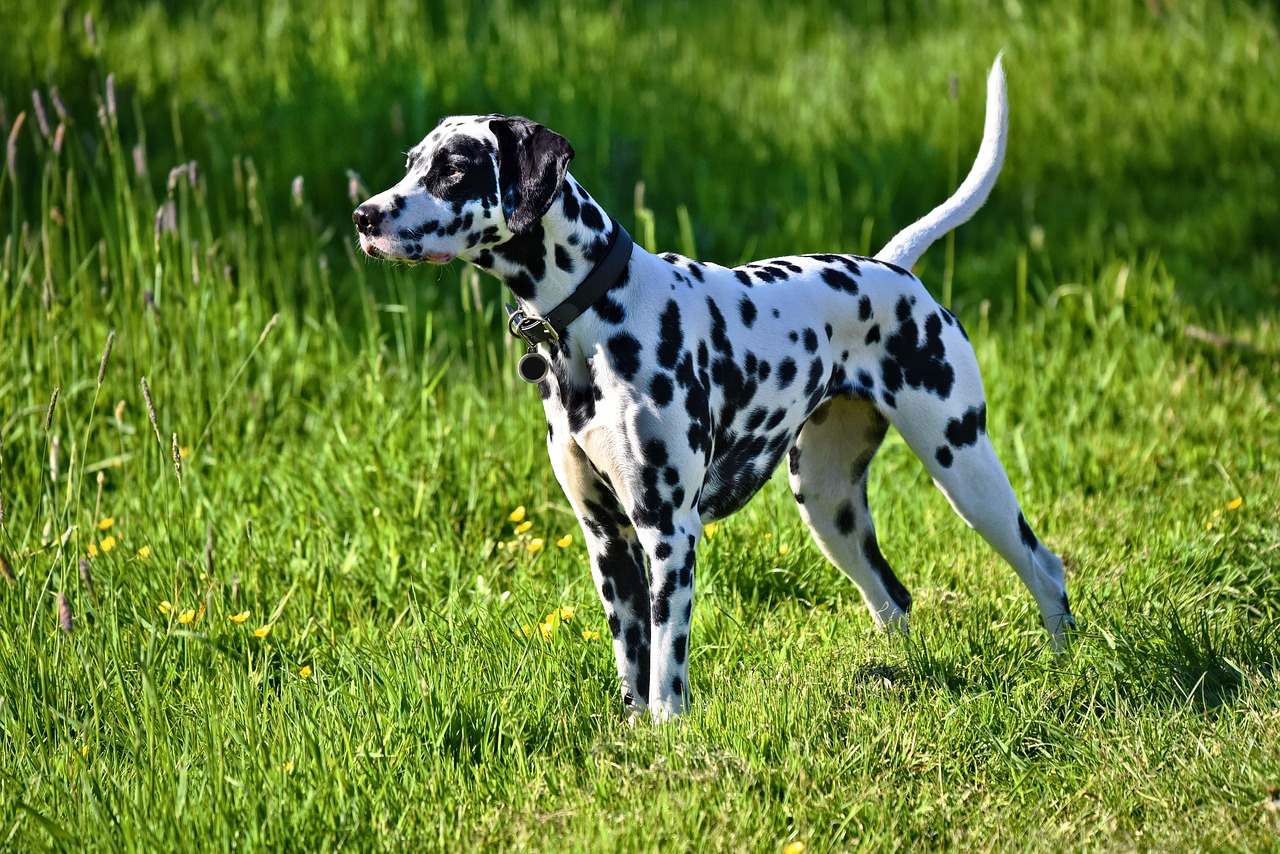Dalmatian Allergies And Common Skin Issues
Can you think of a more iconic image than an old-fashioned fire truck racing by with a Dalmatian hanging out the window? Today, Dalmatians are kept as house dogs. Extremely loyal and alert, they are also very active. Known for their distinctive spotted coat, Dalmatians used to accompany horse-drawn carriages before their role as firehouse superstars. Dalmatians make terrific hiking and running companions due to their stamina. However, Dalmatians by nature are guard dogs, and they can be protective of their families. They do make terrific house dogs, but they tend to thrive in a house without small children.
While Dalmatians, like most dogs, do a bit of shedding, regular brushing should keep the shedding under control. Using a rubber curry comb or a mitt designed for grooming should be enough to keep your Dal looking its best. However, many owners find that dalmatian skin is particularly prone to issues like dry skin or flakes. Often the answer to Dalmatian skin issues is simply to supplement their diet with omega-3 rich fish oils offered by SeaPet. Read on to learn more about common Dalmatian skin ailments and the different approaches you can take to address them.
Dalmatian Skin Issues: Allergies, Parasites, and More
In addition to their distinctive coat, Dalmatians are well-known for their tendency toward topical allergies, so switching shampoos or treating your pup to a new dog bed must be done with caution. If you notice flaking, bumps, or redness, check in with your vet. Topical allergies can also manifest as hives. These puffy bumps on your Dalmatian’s skin can be caused by, you guessed it, different shampoo, new bedding, and other environmental changes.
If your Dal suffers from topical allergies, the treatment could be as simple as discontinuing the use of the shampoo or switching to another bed. Your vet may also prescribe creams or lotions to help your dog’s skin and coat get better. But if your dog seems to be suffering from what seems like seasonal allergies, the culprit is likely airborne allergens such as pollen, dust, or mildew. You may have to consider pharmaceutical treatments like allergy pills.
And of course, it’s important to keep up with your flea and tick treatments too. Fleas, ticks, and other parasites can cause your dog to scratch relentlessly, irritating their skin or exacerbating other existing Dalmatian skin issues. Parasites can be difficult to get rid of once they’ve settled into your home, so it’s in your (and your dog’s) best interest to take a proactive stance when it comes to flea and tick control.
Dalmatian Bronzing Skin Syndrome
No, your dog isn’t getting a tan. Bronzing skin syndrome is a type of irritation found exclusively in Dalmatians. Known as “Dal Crud”, it typically manifests itself as a stripe of bronze or pinkish coloration from head to tail. You may also notice hair loss and follicle inflammation. Dalmatian bronzing skin syndrome is thought to be hereditary. If your Dal is showing symptoms of DBS, take your dog to a vet to get it accurately diagnosed. DBS can only be confirmed through a skin biopsy.
There is no known cure for Dalmatian bronzing syndrome, and dogs with DBS may be especially prone to further skin infections. There are many different ways to manage this disorder, and your vet will help you figure out what the best course of action is. This could include dietary modifications such as adding fish oil supplements or prescribing special creams or shampoos.
What Do You Do About A Dalmatian With Dry Skin?
If you notice your Dal scratching, chewing, or licking themselves excessively, there’s likely something going on. Set up an appointment with your vet to get your dog checked out as soon as possible. If during your visit, underlying causes of a flaky or dry, dull coat have been ruled out, one thing many vets will recommend is to add fish oil for dogs to your Dal’s diet. Fish oil is rich in omega-3 fatty acids, which have a positive effect on a dog’s skin and coat. Unfortunately, dogs don’t generate this compound naturally in their bodies, so the best solution to Dalmatian skin issues often starts with a fish oil supplement.
Fish oil supplements are one of the most well-received supplements when it comes to taste, so it’s usually simple to get it into your dog — simply mix it in with their food. The fishy taste is typically very appealing to dogs! If your Dal isn’t a fan, fish oil capsules are an equally effective way to get your dog the omega-3s they need. If you have trouble getting your dog to take a pill, here’s a hint: we wrap them up in cheese or tuck them into a chunk of hot dog so it seems like they’re getting a tasty treat.
Where Do I Find The Best Fish Oil for Dalmatians?
Fish oils for dogs are easy to find, but it’s important to choose the right brand. No, it’s not what’s on the front that matters. Turn the bottle around, because reading the label is a smart place to start. High-quality fish oil should be made from small fish like sardines instead of large fish like cod. It should also be distilled to ensure that any toxins like heavy metals are removed. You can feel confident that you’re getting a quality product if it’s been third-party tested — producers of fishy fish oil usually don’t submit their products for outside testing.
In addition to seeking out a high-quality product, many owners also look for a fish oil that is enriched with additional vitamins like A, D, and E. Vitamin A supports healthy vision and immune function. Vitamin D is known for promoting strong bones, and Vitamin E encourages healthy skin and coat. At SeaPet, we offer owners a variety of fish oils that cater specifically to your Dal’s diet, so pick some up today if you’re looking for an all-natural way to address your Dalmatian’s skin issues.
Image Credit:
https://pixabay.com/photos/dalmation-dog-dog-animal-mammal-3382090/




